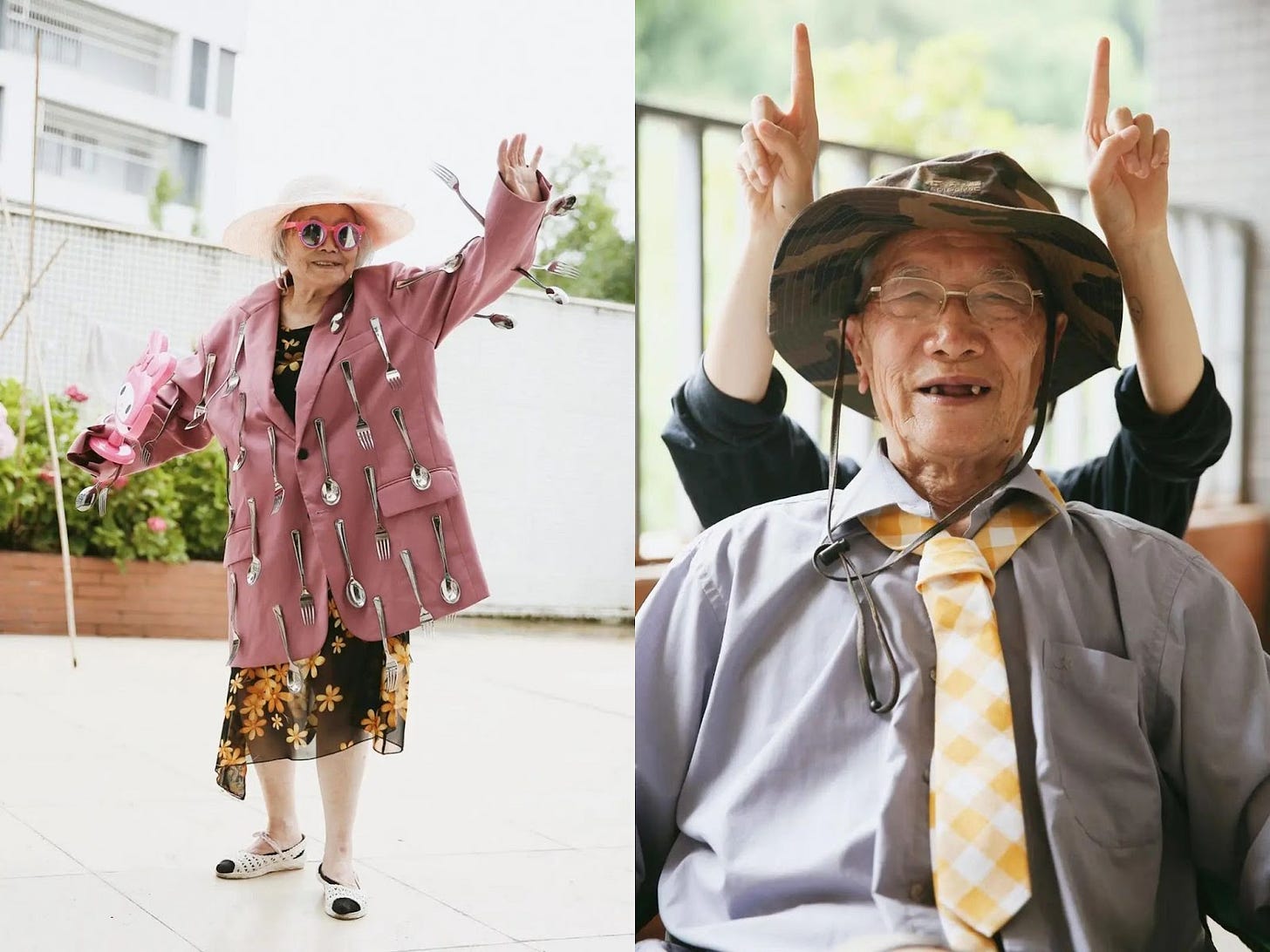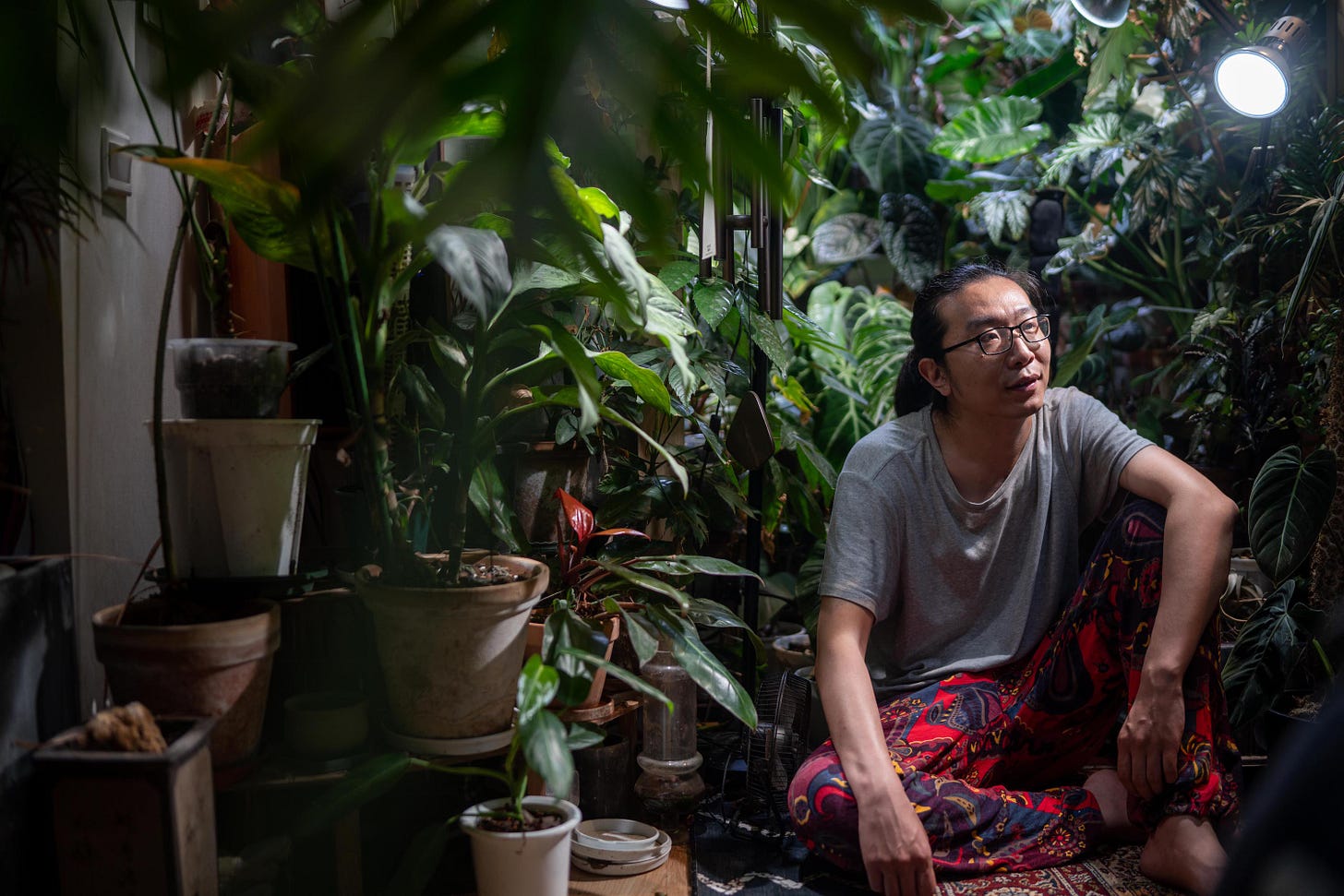#Issue 17: Create your own god + 'Still Young' seniors, and more
A variety of stories ranging from on-demand deities to the latest internet productivity hack.
Hi there,
This is Yan, Charlotte and Beimeng.
In this issue, we look at divine figurines that offer all kinds of blessings: from excelling in exams to obtaining a visa. Then we delve into a fun, collaborative project between a millennial photographer and a group of seniors. It turns out, they all have something to learn from one another. Additionally, we highlight stories that reflect on Hong Kong’s tumultuous 2022, escape into the tropical worlds hidden in Beijing apartments, and open virtual doors into online study rooms where (silent) togetherness is the best productivity hack.
But first, a small celebration is due: we graduated! Since last October, we have been part of a 100-day Entrepreneurial Journalism Creator Program (EJCP). The program was perspective-changing: we learned with and from a diverse range of independent media initiatives focused on sharpening hyper-local content and improving media representation. Our peers included Karakaya Talk, a news channel centering BIPOC experiences in Germany, and Mongolia Media Watch, a newsletter tracking the media environment in Mongolia and Central Asia.
The program made us reflect a lot on community and sustainability. We are putting together our learnings for EJCP’s Medium page, and we’d love to share them with you here once it is published. (This is not an advertisement, but if you’re a journalism creator, you’re missing out if you don’t check out the program. 😉)
Far & Near is a completely independent, reader-funded, paywall-free newsletter, and we need your support to continue producing quality content every other week. If you like our work, please consider becoming a paid member.
The ‘Takeout’ Boddhisatva, the God of Six-packs —You Name It
When photographer Zhang Xiao first saw photos of quirky wooden statues of unusual divinities making the rounds on WeChat a few years ago, he was immediately hooked. He tracked down the origin of these unique idols to a temple in Ningbo, Zhejiang province, where “personalized deities” are designed, then carved by local artisans for worshippers’ (read: clients’) specific needs. Selling your products internationally? There’s the God of Foreign Trade. Having an argument with your spouse? The God of Let’s-Talk-It-Out has you covered. Zhang’s project indeed reflects a truth of our capitalist world: even the gods can be products to meet market demand. “Whatever ‘god’ you want, just create it,” says Zhang in an interview with Yit, a popular lifestyle video website, “This speaks to the zeitgeist of our time.”

This story of customized divinities fits into Zhang’s larger body of work delving into how urban and rural China diverge in tastes, desires, and belief systems. The idols’ aesthetics and construction quality—cheap, with crude colors and simple shapes—may not register as art, or even craft, to an urbanite. But to Zhang, this is a rare embodiment of the inner world of China’s rural population. Zhang, who grew up in rural Shandong, himself initially sought to reject the rawness of folk aesthetics after moving to live in the city, but eventually came to embrace them as a fundamental part of his own identity. “After a period of seeking to get rid of it, I looked back and realized that they were in my heart all along.”
Zhang has since collected more than 10,000 idols from all over China, some of which he designed himself to reflect common social needs and anxieties. The “God of Video Games” went viral for its resemblance to a “lie-flat” millennial, and a visitor to Zhang’s solo exhibition was seen bowing to the “Goddess of Visa,” a sinified Statue of Liberty with the names of visa categories painted over her robes.
What god or goddess would you create? Let us know in the comments!
Seniors Rediscover Their Youthful Spirits
Photographer Yinzi started developing a portrait series called “Still Young” in recent months, exploring how senior citizens can live fulfilling lives, particularly those who are healthy, mobile, and active. As one of the fastest-aging countries in the world, China is projected by WHO to have over 400 million (or 28% of the population) people over the age of 60 by 2040.
Yinzi went into the project with the simple idea of photographing older adults in youthful costumes, but what mattered more to the seniors she photographed was rediscovering a curious and adventurous spirit that they felt had always been in them. Liang Dan, a breast cancer survivor who lacked confidence, gained self-assurance and felt confident wearing a colorful scarf. Kang Hongying, who had been feeling lonely and sad since her husband passed away 4 years ago, found joy in dancing to disco music. Yinzi later went to a nursing home founded and run by millennials to capture more portraits, as well as heart-warming photos of intergenerational care. Through these twinned shoots, she realized that the project was both an opportunity for seniors to try new things that bring them joy, as well as an invitation for young people to let go of the unfounded fear associated with aging.
Other highlights:
Hong Kong news website Initium Media published a special project shot by 12 local photographers looking back at an eventful 2022 in the city: a brutal Omicron outbreak, a single-candidate chief executive election, the forced closures of newsrooms, an exodus of the local population, and the border reopening between Hong Kong and mainland China. However, rather than the actual events, most of the photos document the city’s ambient, disquieting atmosphere, as suggested sardonically in the title of the project: “everything is fine under the sky.”
Online self-study rooms offer silent virtual company and gentle peer pressure to meet deadlines. Similar to StudyGram and StudyTube that emerged in the past few years on Instagram and YouTube, young Chinese use Bilibili live streams and Tencent Meeting rooms to get work done. There are even comprehensive guides on how to become a study influencer.
This Sixth Tone piece breaks down the trend, and offers a fascinating glimpse into the aesthetics of China’s real-life “lo-fi girls.”
Confined at home with little chance of travel during the Covid-19 pandemic, some young people in Beijing began growing tropical plants in their apartments, seemingly defying the city’s markedly non-tropical climate. This story from Caixin looks at how these enthusiastic millennials use humidifiers, lights, fans, and heaters to simulate the environments their plants need. Some even turned their passions into successful ventures. But behind the burgeoning market is a desire to seek solace amid the unrelenting circumstances of the past three years.
Who we are:
Yan Cong is formerly a photojournalist currently pursuing a research MA in new media and digital culture in Amsterdam.
Beimeng Fu is a video journalist based in Shanghai. She is a lover of languages and documentaries.
Ye Charlotte Ming is a journalist and visual editor covering stories about culture, history, and identity. She’s based in Berlin.
Writers: Beimeng Fu, Yan Cong; Editor: Charlotte Ming; Copy editor: Krish Raghav
If you like this post, please share it with others and consider becoming a paying member.
If you’d like to make a one-time donation, click here:








